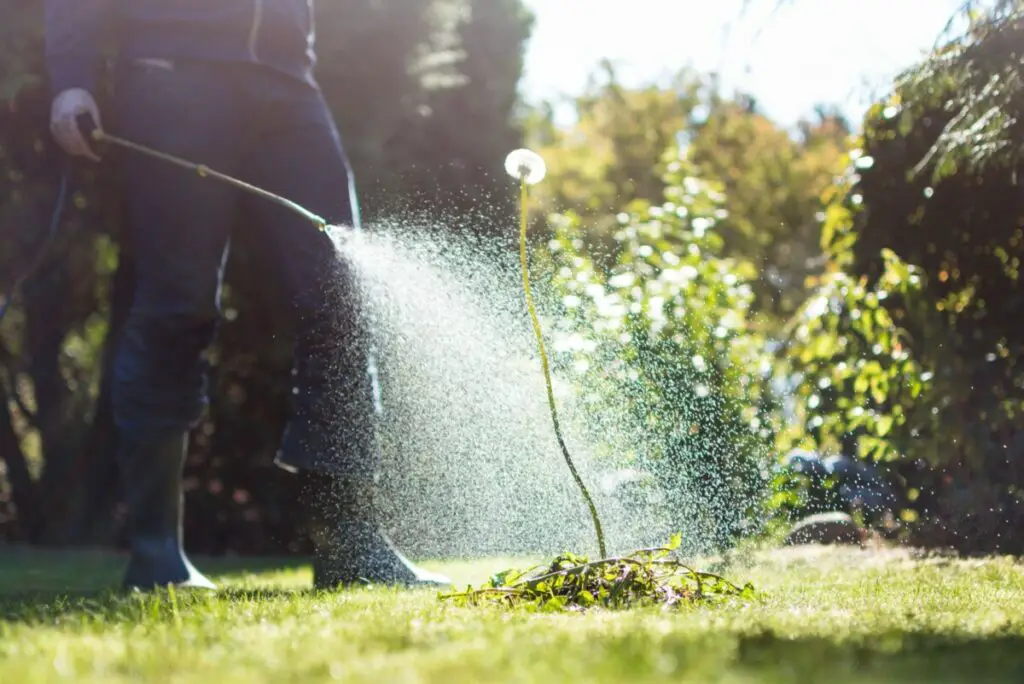
Maybe you are new to the gardening scene, or you are an avid gardener with some liquid weed killer that is a few years old. Just how long does liquid weed killer last? Here, we have the answers.
Herbicides, otherwise known as weed killers or pesticides, have a shelf life of 1 to 4 years after opening. This is because as time passes, the product will lose its potency and will not kill weeds effectively. However, if it is shut and out of direct sunlight or high heat, it can last for 5 years.
To get a “how-to” guide on liquid week killer and understand how it affects your environment, continue reading below!
Does Liquid Weed Killer Expire?
Most herbicides do not have an expiration date and are meant to last years on a shelf. However, products with active ingredients that are found in certain liquid weed killers will have a shelf life of only 1 to 4 years. This life span can even be extended to 5 years if the lid is securely fastened and the product is kept out of direct sunlight and extremely hot rooms.
To know if your liquid weed killer has active ingredients, look at the ingredient list or find it online. There, it will either say active ingredients, or you can look through each ingredient and do research on each one. Regardless, liquid weed killers lose their potency over a period of a few years if active ingredients are included.
How Do I Use Liquid Weed Killer?
To use liquid weed killer, simply spray the formula onto the affected area. Make sure you are doing this during a time when winds do not exceed 5 miles per hour, or the liquid weed killer will not go where you want it to go. Make sure to apply it when the outside temperature is below 85 degrees Fahrenheit within 24 hours of being sprayed.
Spray the formula while keeping the nozzle close to the ground. Do not drench your plants, but apply just enough to wet the surface of them and the surrounding soil. Also, keep an eye out for the specific weed you are trying to kill. For weeds such as broadleaf weeds, one application will do the trick. Harder weeds such as violets will likely require two or more applications.
When using liquid weed killer, keep in mind environmental stressors that may influence how well your product actually works. Here are some factors that may influence the effectiveness of your weed killer.
- Temperature: If the outside temperature is too high, the chemicals may become more toxic and not work as well.
- Imbalanced pH levels: If the weed killer’s pH levels are too high or too low, it causes the herbicides to break down faster. Then, it will not work as well.
- Dissolved oxygen (DO): The amount of dissolved oxygen in your plants can affect how well the weed killer works.
- Unspecified toxins: Weed killers that have surfactants may be toxic to animals and the environment.
Is Weed Killer Bad for My Plants and the Environment?

Most weed killers have a chemical known as glyphosate. This chemical prevents plants from making the proteins necessary to live and thrive by stopping a specific enzyme pathway known as the shikimic acid pathway. However, it is not only dangerous to humans if ingested, it can cause harm to other nearby plants and animals if not used correctly.
According to the United States Environmental Protection Agency, weed killers that use surfactants may also be more toxic to animals than active ingredients or glyphosate. Keep this in mind as you do research on your liquid weed killer.
Glyphosate binds tightly to soil particles, preventing the chemical from reaching groundwater. It does not degrade quickly in plants, letting the product do its job. However, if an animal eats plants affected by glyphosate, it can experience health effects. There has been a conversation among scientists about if glyphosate leads to cancer. One study found that it does not, while another study indicated that it might.
As far as aquatic animals are concerned, herbicides, or weed killers, do not affect them directly. As explained before, weed killer clings tightly to the soil, so they don’t get into water sources. However, weed killers can still destroy aquatic plants that indirectly affect fish and other invertebrates. It is done by modifying the habitat and other food availability, hurting the ecosystem as a whole. When using weed killer, be sure to use it carefully and responsibly.
What are Other Ways I Can Kill Weeds?
If using traditional liquid weed killer is something you are not interested in, there are many other ways you can kill weeds. Watch the following video to find out about one way you can kill weeds without using weed killer.
Those who are wanting to avoid chemical liquid weed killers can try natural or organic weed-killing methods. One effective method is by using a weed-burning torch such as the Flame King Weed Burner (view on Amazon). Burning the weeds (safely) stops photosynthesis within the plant, extracting water from the roots, and lessens the likelihood of the plant returning. This method only works in gravel or rocky areas that cannot accidentally start a fire.
If you are okay with using weed killer but want to use an environmentally-friendly kind, Earth’s Ally Weed and Grass Killer (check out on Amazon) is a great weed killer, as it uses salt to eliminate pesky weeds. This formula does not harm other plants in your garden, as well as house pets. You can watch it being used in the following video.
Before you go, be sure to check out our top-ten list of herbicides here that, when applied correctly, are safe to use in your garden.
When searching for a new product, keep in mind a marketing tactic known as “greenwashing“. Greenwashing is when companies use unsubstantiated claims that a company’s products are environmentally friendly. It can even be a lie that a company has a greater positive environmental impact than they actually do.
If having an environmentally friendly weed killer is important to you, do research on the company that manufactures the products you are interested in. If you have animals or small children, make sure the ingredients of the weed killer that you use are not toxic to them.

